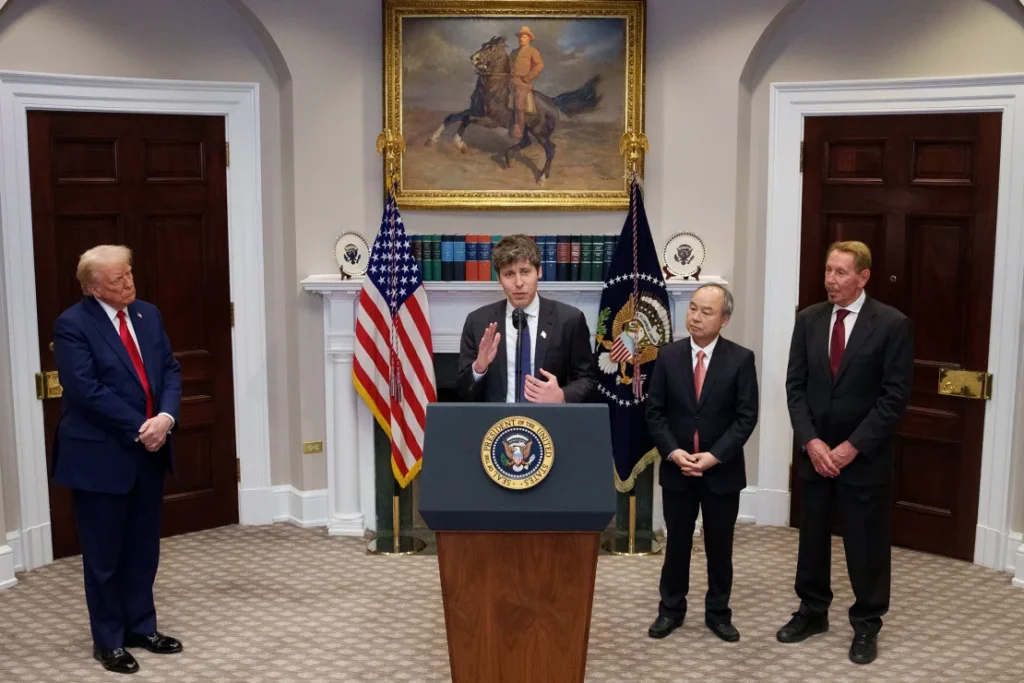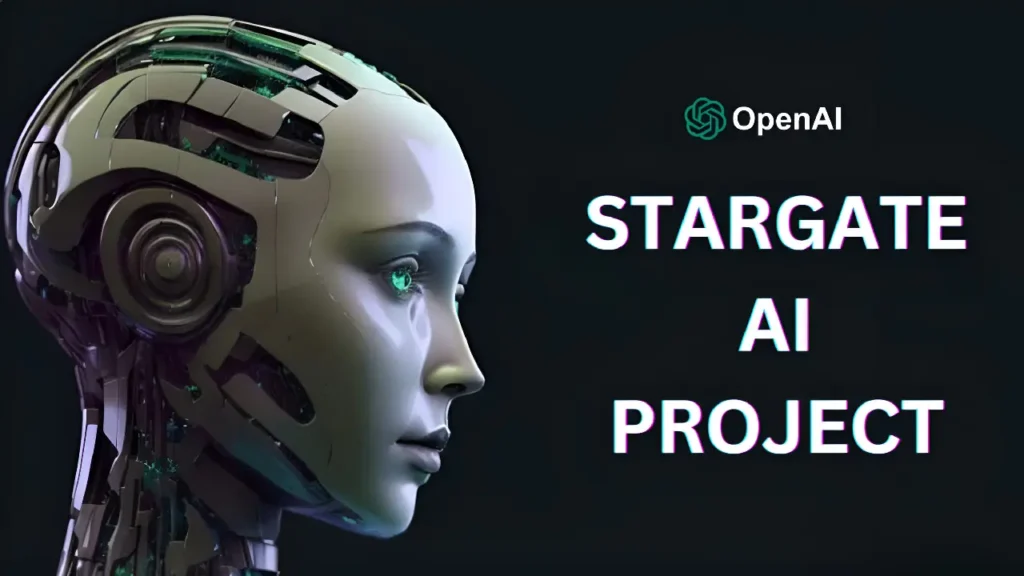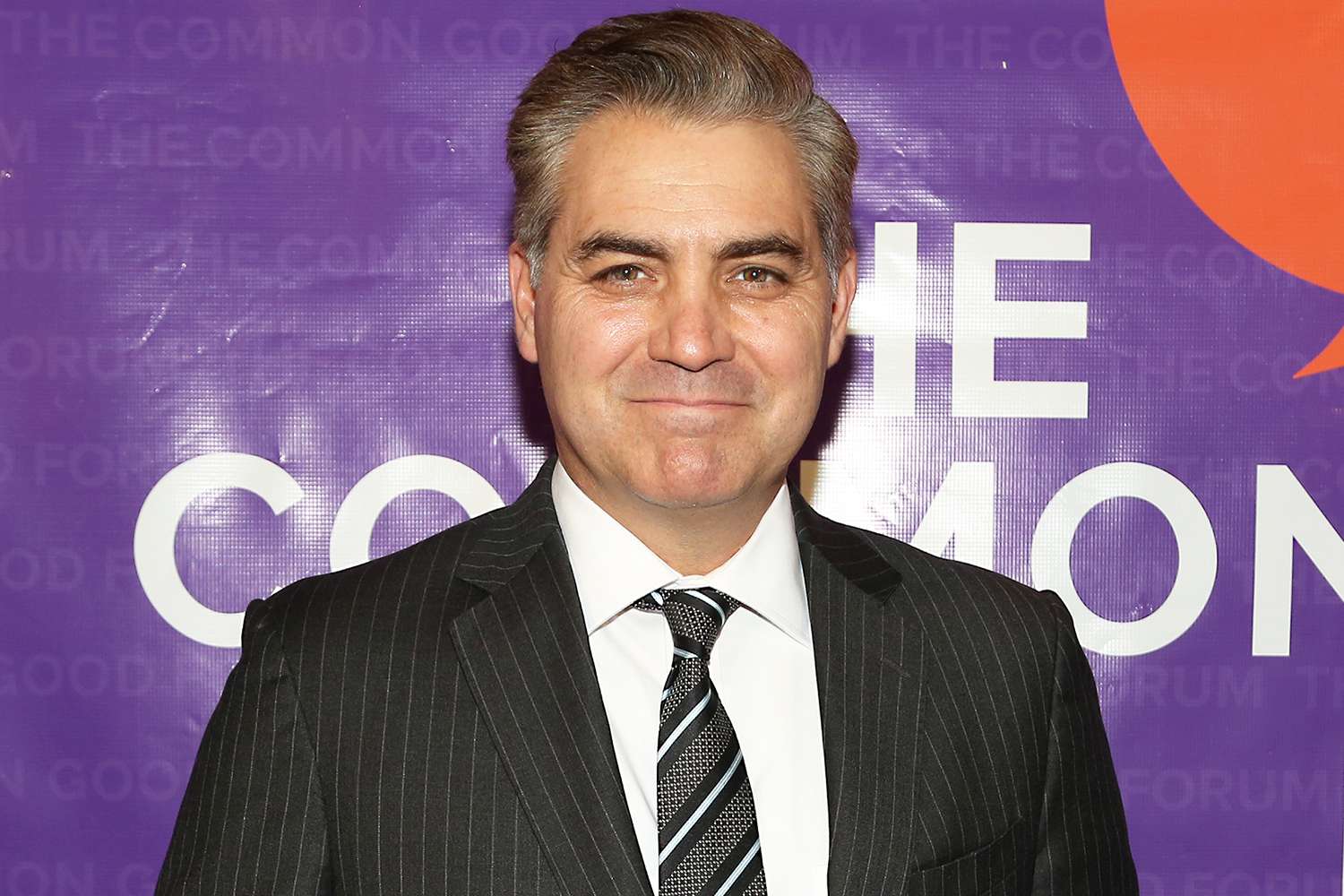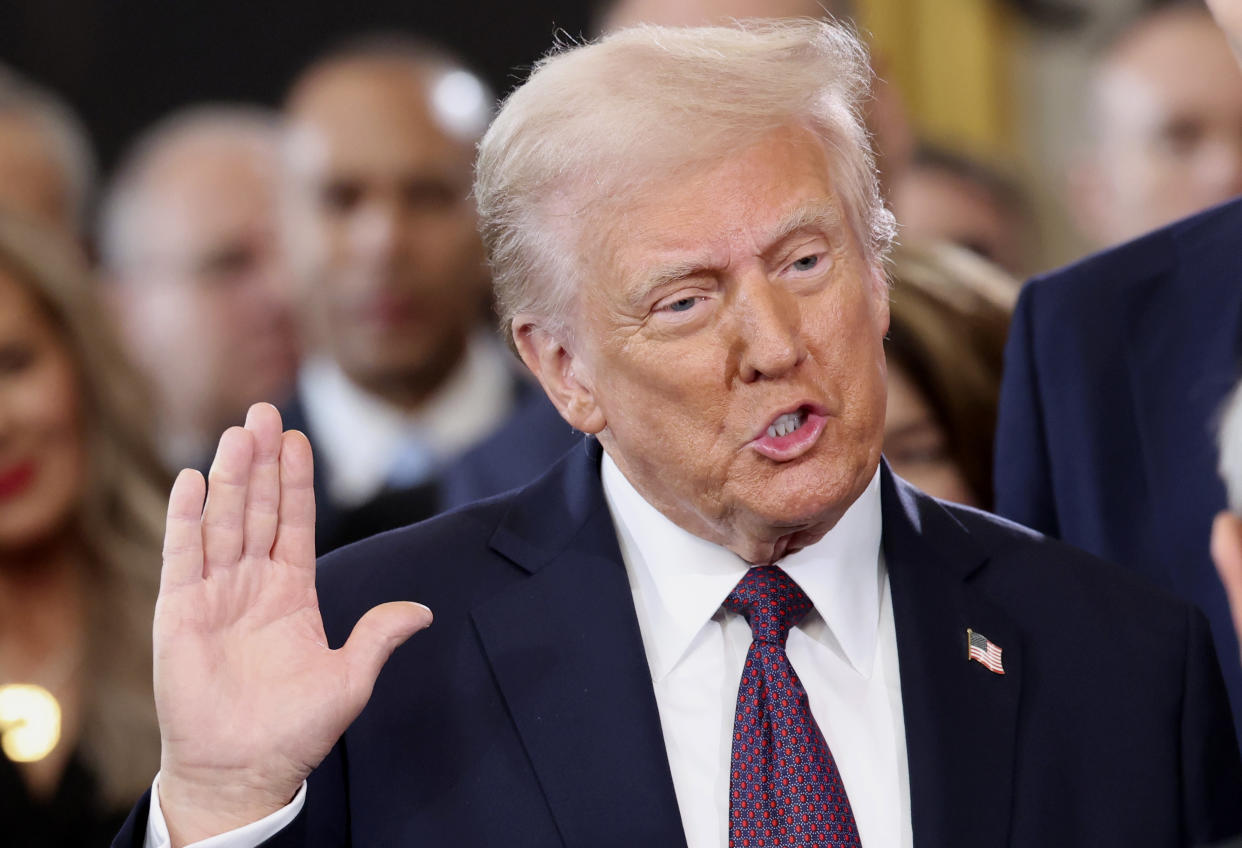
Stargate AI : Explore the ambitious Stargate AI project, a collaboration between OpenAI, SoftBank, Oracle, and MGX, aiming to revolutionize AI infrastructure in the United States with a $500 billion investment.
Table of Contents
The landscape of artificial intelligence (AI) is undergoing a transformative phase with the introduction of the Stargate AI initiative. This ambitious project, announced on January 21, 2025, is a collaborative effort between OpenAI, SoftBank, Oracle, and MGX, aiming to invest up to $500 billion in AI infrastructure across the United States by 2029.
The Genesis of Stargate AI
The inception of Stargate AI was marked by a significant announcement at the White House, where President Donald Trump, alongside key figures such as Sam Altman (CEO of OpenAI), Larry Ellison (Chairman of Oracle), and Masayoshi Son (CEO of SoftBank), unveiled the project. President Trump described it as “the largest AI infrastructure project in history,” emphasizing its potential to create over 100,000 jobs in the United States.
Objectives and Vision
Stargate AI is poised to revolutionize the AI landscape by constructing extensive data centers and virtual infrastructure to support the next generation of AI advancements. The project addresses the current bottleneck in data centers required for advanced AI models, enabling U.S. companies to compete globally, particularly with nations like China.
Financial Commitments and Structure
The venture commenced with an initial investment of $100 billion, with plans to escalate funding to $500 billion by 2029. OpenAI holds operational responsibility, while SoftBank oversees financial aspects. Key technology partners include Arm, Microsoft, Nvidia, Oracle, and OpenAI, showcasing a united effort in expanding AI capabilities and infrastructure in the United States.
Industry Reactions and Controversies
Despite the project’s promising outlook, it has faced criticism from notable industry figures. Elon Musk, CEO of xAI and a former co-founder of OpenAI, expressed skepticism regarding the project’s funding. He claimed that SoftBank had secured less than $10 billion for the project, a statement disputed by OpenAI’s CEO, Sam Altman. This public exchange highlights underlying tensions and competition within the AI industry.
Implications for the AI Ecosystem
The Stargate AI initiative signifies a monumental step in AI development, with the potential to accelerate advancements in artificial general intelligence (AGI) and create substantial employment opportunities. However, the project’s success hinges on securing the proposed funding and navigating the competitive dynamics of the AI industry.
Unveiling Stargate: The $100 Billion AI Infrastructure Investment and the Drama Around It
In a groundbreaking announcement from the White House, President Donald Trump unveiled an ambitious $100 billion initiative to establish a new artificial intelligence infrastructure company called Stargate. The initiative has garnered backing from some of the biggest players in the tech world, including OpenAI, Oracle, and SoftBank. While the announcement promises to cement the United States’ leadership in the rapidly evolving AI industry, it has also sparked a public feud involving Elon Musk, one of the most influential figures in tech and a close associate of the administration.
Here, we delve into the details of the Stargate initiative, Musk’s criticisms, and the implications for the broader AI industry.
Stargate: The Vision for America’s AI Future
The Stargate project is poised to be one of the largest investments in artificial intelligence infrastructure in history. President Trump announced the initiative alongside OpenAI CEO Sam Altman, Oracle CTO Larry Ellison, and SoftBank CEO Masayoshi Son. These tech giants have pledged an initial $100 billion investment, with plans to scale up to $500 billion over the coming years.
Stargate aims to revolutionize AI infrastructure by focusing on three key areas:
- Data Centers and Computational Power: Building state-of-the-art data centers to handle the growing computational demands of AI research and deployment.
- AI Development and Training: Providing a platform for developing cutting-edge AI models, including large language models, computer vision systems, and robotics.
- Public and Private Sector Collaboration: Bridging the gap between public institutions and private enterprises to accelerate AI adoption in critical sectors such as healthcare, defense, and transportation.
The initiative is designed to position the United States as the global leader in artificial intelligence, countering growing competition from China and the European Union.
Musk’s Criticism: A Notable Dissent
Despite the promising outlook, Elon Musk, CEO of Tesla and SpaceX, publicly criticized the Stargate project shortly after its announcement. Writing on his social media platform, X, Musk questioned the financial viability of the initiative, stating, “They don’t actually have the money. SoftBank has well under $10B secured. I have that on good authority.”
This criticism is significant, given Musk’s close ties to the Trump administration. Musk’s involvement in key decisions, such as Trump’s pardon of Ross William Ulbricht, the founder of the Silk Road dark web marketplace, underscores his influence within the administration. However, Musk’s relationship with OpenAI and its CEO, Sam Altman, is strained, which may provide context for his public disapproval.
The Musk-Altman Feud
Musk’s criticisms of Stargate may stem, in part, from his ongoing legal battle with OpenAI. Musk, a co-founder of OpenAI, parted ways with the organization years ago but has since accused it of abandoning its nonprofit mission. In a lawsuit, Musk alleges that OpenAI has prioritized profit over its original commitment to democratize AI technology. He has also expressed distrust toward Altman, further fueling speculation about his motives for opposing Stargate.
Funding Challenges and Skepticism
Musk’s financial concerns are not entirely unfounded. While the companies involved have pledged $100 billion to the project, they have not disclosed the specifics of how these funds will be allocated or sourced. Critics argue that such large-scale initiatives often rely on a mix of equity investment and debt, rather than having the entire sum readily available.
This financial ambiguity has raised questions about the feasibility of the project’s ambitious goals. However, supporters argue that the involvement of major players like Oracle, SoftBank, and OpenAI lends credibility to the initiative’s prospects.
Implications for the AI Industry
The Stargate project, if successful, could have far-reaching implications for the AI industry:
1. Accelerated Innovation
The investment in AI infrastructure will provide the computational resources needed to develop next-generation AI models. This could accelerate breakthroughs in fields such as natural language processing, computer vision, and autonomous systems.
2. Economic Growth
The initiative is expected to create thousands of jobs in technology, construction, and research. By fostering innovation, Stargate could also stimulate economic growth across multiple sectors.
3. Global AI Leadership
With countries like China investing heavily in AI, Stargate could help the United States maintain its competitive edge. By focusing on public-private collaboration, the project aims to establish the U.S. as a leader in both AI research and practical applications.
Challenges Ahead
Despite its potential, the Stargate project faces several challenges:
1. Financial Viability
The skepticism surrounding the project’s funding underscores the need for transparency. Stakeholders will need to address these concerns to maintain public and investor confidence.
2. Regulatory Hurdles

AI development is fraught with ethical and regulatory challenges. The project will need to navigate issues such as data privacy, algorithmic bias, and the potential misuse of AI technologies.
3. Industry Competition
The involvement of multiple companies with competing interests could complicate the execution of the initiative. Ensuring collaboration while managing conflicts will be crucial for the project’s success.
The Stargate initiative represents a bold vision for the future of artificial intelligence in the United States. By bringing together some of the biggest names in tech, the project has the potential to transform the AI landscape. However, the public criticism from Elon Musk and questions about the project’s financial underpinnings highlight the challenges that lie ahead.
As the world watches, the success or failure of Stargate will serve as a litmus test for America’s ability to lead in the AI era. Whether it’s a stepping stone to innovation or a cautionary tale of ambition outpacing practicality, one thing is certain: the Stargate project has already ignited a heated debate about the future of artificial intelligence.
Conclusion
Stargate AI represents a bold endeavor to position the United States at the forefront of AI innovation. As the project unfolds, it will be imperative to monitor its progress, funding developments, and the broader implications for the global AI landscape. visit THENEWSIFY for more news









Leave a Reply